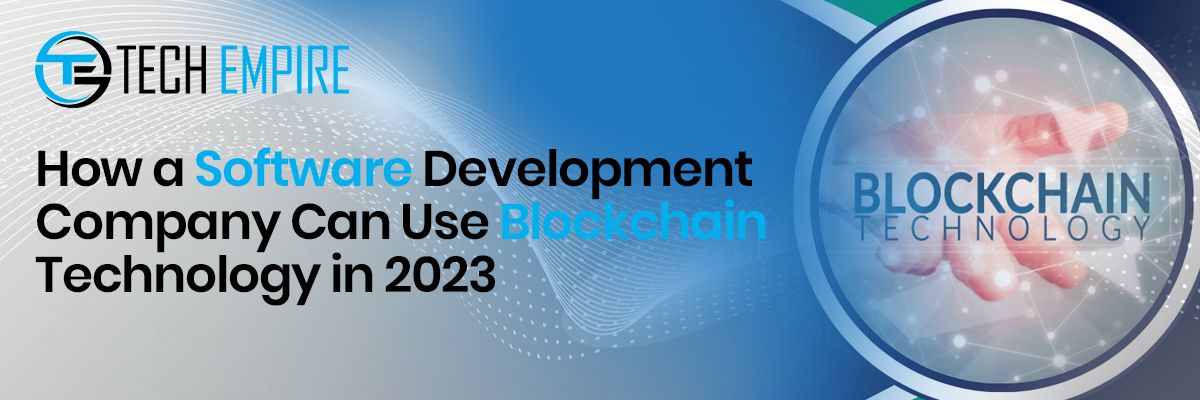How a Software Development Company Can Use Blockchain Technology in 2023
Staying updated in the ever-changing landscape of technology is critical for every software development company in California. Blockchain technology has made waves in recent years and has enormous potential.
Blockchain, originally intended to be the underlying technology for cryptocurrencies such as Bitcoin, has now expanded its horizons and is revolutionizing various industries, including software development.
In this blog post, we will define blockchain technology and look at six to seven ways a software development company can use it in 2023.
What is Blockchain Technology?
Blockchain technology, frequently referred to as a revolutionary innovation, is a decentralized and distributed ledger system that fundamentally changes how data is stored and transactions are verified.
A blockchain is a perpetually growing chain of blocks containing a record of multiple transactions. These transactions are secured with cryptographic techniques and chronologically linked, forming an unchangeable and transparent history of all network actions.
5 Key elements of Blockchain Technology
1. Decentralization
Unlike traditional centralized systems, where a single entity maintains control, blockchains run on a global network of computers (nodes). This decentralization ensures that no single entity has absolute power, fostering trust and lowering the risk of manipulation.
2. Immutability
Once data is recorded on a blockchain, it is nearly impossible to change or delete it. This immutability is achieved through cryptographic hashing, which makes the contents of each block dependent on the previous one, resulting in a secure and tamper-resistant record.
3. Transparency
Blockchains are open and transparent, allowing all network participants to see the full history of transactions. Transparency fosters trust and ensures that inconsistencies or fraudulent activities are quickly identified and corrected.
4. Security
Blockchain employs robust encryption techniques to protect data and transactions. A malicious actor must compromise most of the network’s nodes to manipulate a blockchain, making it highly secure against attacks.
5. Consensus Mechanisms
Blockchains validate and add new transactions to the ledger using consensus mechanisms such as Proof of Work (PoW) or Proof of Stake (PoS). These mechanisms ensure all nodes agree on the blockchain’s state, preventing double-spending and maintaining integrity.
Now that we understand blockchain technology better let’s look at how software development firms can capitalize on its potential in 2023.
7 Ways to Utilize Blockchain Technology in 2023
Blockchain technology’s versatility and transformative potential make it a valuable tool for software development firms seeking innovative solutions. Here are a few specific ways that software companies can use blockchain in 2023:
1. Smart Contracts Development
Smart contracts are becoming increasingly relevant across industries beyond their initial use in the financial sector. Software development firms can create customized smart contracts tailored to specific needs. In the legal sector, for example, smart contracts can automate contract execution, ensuring terms are met, and payments are made automatically upon condition fulfillment. They can improve the efficiency of the healthcare ecosystem by facilitating secure data sharing between patients, providers, and insurers.
2. Supply Chain Management
The role of blockchain in supply chain administration goes far beyond transparency and traceability. It can automate product tracking, monitoring, and authentication throughout the supply chain. Companies can create solutions integrating IoT devices with blockchain to provide real-time product conditions and location data. This information can trigger automated actions such as reorder requests or quality control checks, improving supply chain efficiency and reducing errors.
3. Identity Verification
Blockchain-based identity verification solutions gain traction as concerns about data privacy and identity theft grow. Software companies can create systems that allow people to own and control their digital identities. These decentralized identity platforms could replace traditional authentication methods, improving security and privacy while reducing reliance on centralized identity providers.
4. Decentralized Applications (DApps)
The decentralized application ecosystem rapidly expands, providing numerous opportunities for software development firms. DApps developed on blockchain networks give users more control over their data and transactions. DApps catering to various niches, such as decentralized finance (DeFi), healthcare, education, and entertainment, can be expected in 2023. Software companies can set an example by developing user-friendly DApps with enhanced security features.
5. Tokenization of Assets
Asset tokenization is still a promising application. Businesses can develop platforms for fractional ownership of assets such as real estate, art, and commodities. These platforms can potentially democratize investment opportunities by making high-value assets more accessible to a broader range of investors. The software can help create, trade, and manage asset-backed tokens, increasing liquidity and lowering entry barriers for investors.
Given the prevalence of data breaches and privacy concerns, blockchain can be used to develop secure data storage and sharing solutions. Software development firms can build blockchain-based data marketplaces where individuals have control over their data. Users can grant need-to-know access to their data, ensuring privacy and conformity with data protection regulations while potentially profiting financially from sharing their data.
7. Supply Chain Financing
Blockchain technology has the potential to disrupt supply chain financing. Software companies can streamline the financing process for supply chain businesses by developing blockchain-based financing platforms. These platforms can automate transaction and asset verification, reducing the time and cost of obtaining financing. This benefits not only suppliers but also the overall efficiency of the supply chain.
The Takeaway
Blockchain technology is more than a trendy buzzword; it is a transformative force with great promise for software development firms in 2023 and beyond. Its ability to provide transparency, security, and decentralization opens up possibilities for disruption and innovation. Blockchain can be a game changer for software development companies willing to embrace it, whether for creating smart contracts, revolutionizing supply chain management, or improving data security. Companies that harness the power of blockchain will be best positioned to flourish in the digital age as we move forward.

